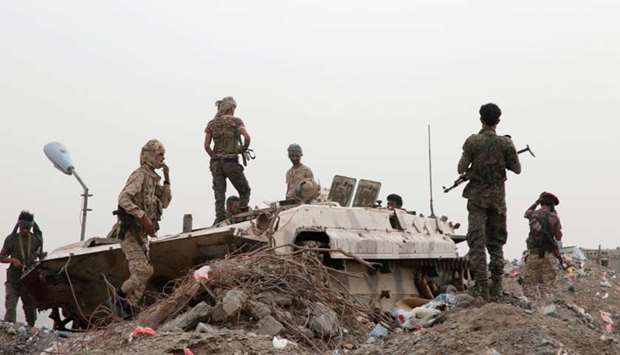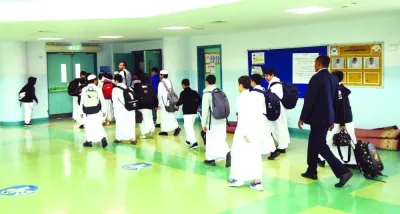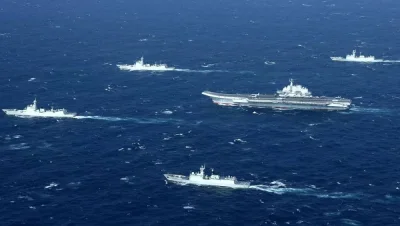* Separatists seize bases from nominal allies in government
* Rifts and violence hampering UN peace efforts
* Overall war stuck in stalemate, tens of thousands dead
Southern separatists seized two Yemeni government military bases near the southern port of Aden early on Tuesday, triggering fresh clashes between nominal allies that have complicated UN peace efforts, residents and officials said.
The separatists and government are both part of a Saudi-led military coalition battling the Iran-aligned Houthi movement, which took over the capital Sanaa and most major cities in 2014.
But the separatists broke with the government this month, seizing its temporary base of Aden on Aug. 10. On Tuesday, they took two government military bases in Zinjibar, around 60 km east of Aden in Abyan province, residents said.
"What is happening in Abyan is an unjustified escalation by the Southern Transitional Council (STC - the separatists)," the Yemeni government foreign ministry said.
On another front in the north, the Saudi-led coalition said it launched air strikes overnight on Houthi military targets in Sanaa. The coalition said on Tuesday that its air strikes on Sanaa struck caves storing missiles, drones and weapons.
The assault appeared to be in response to Houthi attacks on energy assets in neighbouring Saudi Arabia on Saturday.
The violence and cracks in the coalition could hamper United Nations efforts to push forward peace agreements and talks to end a war that has killed tens of thousands and driven the poorest Arabian Peninsula country to the brink of famine.
The Western-backed, Sunni Muslim coalition intervened in Yemen in March 2015 against the Houthi movement that ousted the internationally recognised government of Abd-Rabbu Mansour Hadi from power in Sanaa in late 2014.
Divisions have spread, with the war - widely seen as a proxy conflict between Saudi Arabia and regional rival Shi'ite Iran - largely stuck in stalemate.
The coalition last week threatened military action if the separatists do not quit government military bases. Saudi Arabia, which wants the coalition to focus on combating the Houthis, has called for a summit over Aden, but it has been delayed due to the separatists' refusal to cede control.
The STC, which is backed by coalition partner the United Arab Emirates, said its forces would hold Aden until the Islamist Islah party, a backbone of Hadi's government, and northerners are removed from power positions in the south.
The standoff has exposed differences between allies Saudi Arabia and the UAE, which in June scaled down its presence in Yemen but still backs thousands of southern separatists that it has armed and trained.
STC fighters seized Aden after accusing Islah, which the UAE regards as an offshoot of the Muslim Brotherhood, of being complicit in a Houthi missile attack on southern forces earlier this month, a charge the party denies.
The separatists' seizure of two more bases in Abyan, Hadi's birthplace, showed they are holding firm to demands for self-rule in the south and to be included in any UN-sponsored talks on Yemen's future.
"For too long the Southern voice has been excluded from any negotiation table," STC said in a statement to the UN Security Council ahead of a Yemen briefing on Tuesday in New York.
"The onus is now on the international community, and in particular the UN Security Council to accept the new realities on the ground."
The separatists, who accuse Hadi's government of mismanagement, aspire to revive south Yemen, which was a separate country before unification with the north in 1990.
Yemeni sources have said the delayed Saudi summit would discuss reshuffling Hadi's government to include STC to end the crisis.
The Houthis, who deny being puppets of Iran and say their revolution is against corruption, point to Aden as proof that Hadi is unfit to rule.
The movement has stepped up cross-border missile and drone attacks on Saudi Arabia in recent months.
The Houthis have also been trying to raise their profile on the international stage, visiting Tehran last week where they held talks with Iranian officials and European diplomats. They also appointed an ambassador to Iran, and Iran appointed one in return.
* Rifts and violence hampering UN peace efforts
* Overall war stuck in stalemate, tens of thousands dead
Southern separatists seized two Yemeni government military bases near the southern port of Aden early on Tuesday, triggering fresh clashes between nominal allies that have complicated UN peace efforts, residents and officials said.
The separatists and government are both part of a Saudi-led military coalition battling the Iran-aligned Houthi movement, which took over the capital Sanaa and most major cities in 2014.
But the separatists broke with the government this month, seizing its temporary base of Aden on Aug. 10. On Tuesday, they took two government military bases in Zinjibar, around 60 km east of Aden in Abyan province, residents said.
"What is happening in Abyan is an unjustified escalation by the Southern Transitional Council (STC - the separatists)," the Yemeni government foreign ministry said.
On another front in the north, the Saudi-led coalition said it launched air strikes overnight on Houthi military targets in Sanaa. The coalition said on Tuesday that its air strikes on Sanaa struck caves storing missiles, drones and weapons.
The assault appeared to be in response to Houthi attacks on energy assets in neighbouring Saudi Arabia on Saturday.
The violence and cracks in the coalition could hamper United Nations efforts to push forward peace agreements and talks to end a war that has killed tens of thousands and driven the poorest Arabian Peninsula country to the brink of famine.
The Western-backed, Sunni Muslim coalition intervened in Yemen in March 2015 against the Houthi movement that ousted the internationally recognised government of Abd-Rabbu Mansour Hadi from power in Sanaa in late 2014.
Divisions have spread, with the war - widely seen as a proxy conflict between Saudi Arabia and regional rival Shi'ite Iran - largely stuck in stalemate.
The coalition last week threatened military action if the separatists do not quit government military bases. Saudi Arabia, which wants the coalition to focus on combating the Houthis, has called for a summit over Aden, but it has been delayed due to the separatists' refusal to cede control.
The STC, which is backed by coalition partner the United Arab Emirates, said its forces would hold Aden until the Islamist Islah party, a backbone of Hadi's government, and northerners are removed from power positions in the south.
The standoff has exposed differences between allies Saudi Arabia and the UAE, which in June scaled down its presence in Yemen but still backs thousands of southern separatists that it has armed and trained.
STC fighters seized Aden after accusing Islah, which the UAE regards as an offshoot of the Muslim Brotherhood, of being complicit in a Houthi missile attack on southern forces earlier this month, a charge the party denies.
The separatists' seizure of two more bases in Abyan, Hadi's birthplace, showed they are holding firm to demands for self-rule in the south and to be included in any UN-sponsored talks on Yemen's future.
"For too long the Southern voice has been excluded from any negotiation table," STC said in a statement to the UN Security Council ahead of a Yemen briefing on Tuesday in New York.
"The onus is now on the international community, and in particular the UN Security Council to accept the new realities on the ground."
The separatists, who accuse Hadi's government of mismanagement, aspire to revive south Yemen, which was a separate country before unification with the north in 1990.
Yemeni sources have said the delayed Saudi summit would discuss reshuffling Hadi's government to include STC to end the crisis.
The Houthis, who deny being puppets of Iran and say their revolution is against corruption, point to Aden as proof that Hadi is unfit to rule.
The movement has stepped up cross-border missile and drone attacks on Saudi Arabia in recent months.
The Houthis have also been trying to raise their profile on the international stage, visiting Tehran last week where they held talks with Iranian officials and European diplomats. They also appointed an ambassador to Iran, and Iran appointed one in return.



